中考英语二轮专题复习课件 主谓一致(21张PPT)
文档属性
| 名称 | 中考英语二轮专题复习课件 主谓一致(21张PPT) |

|
|
| 格式 | ppt | ||
| 文件大小 | 696.0KB | ||
| 资源类型 | 试卷 | ||
| 版本资源 | 通用版 | ||
| 科目 | 英语 | ||
| 更新时间 | 2020-12-01 20:58:22 | ||
图片预览

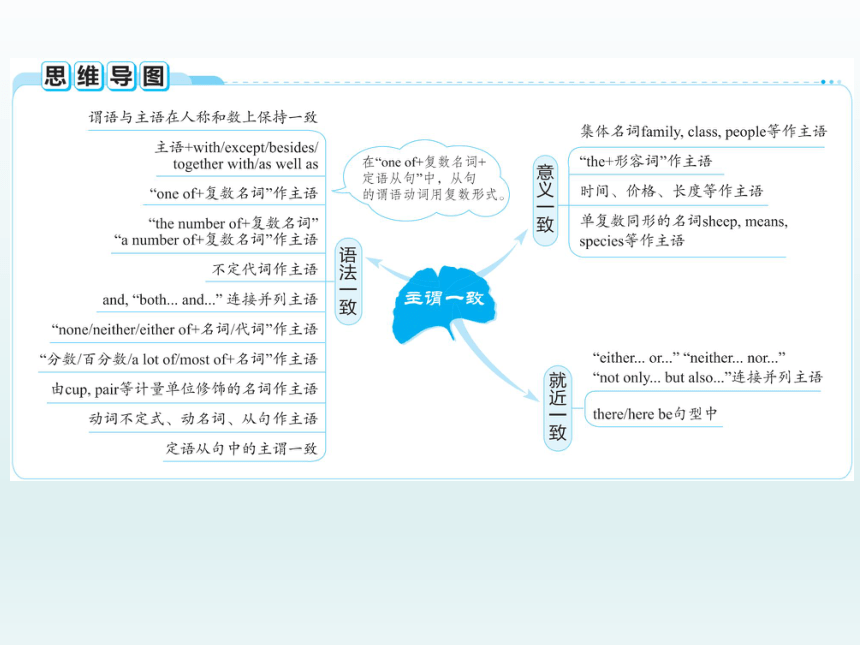
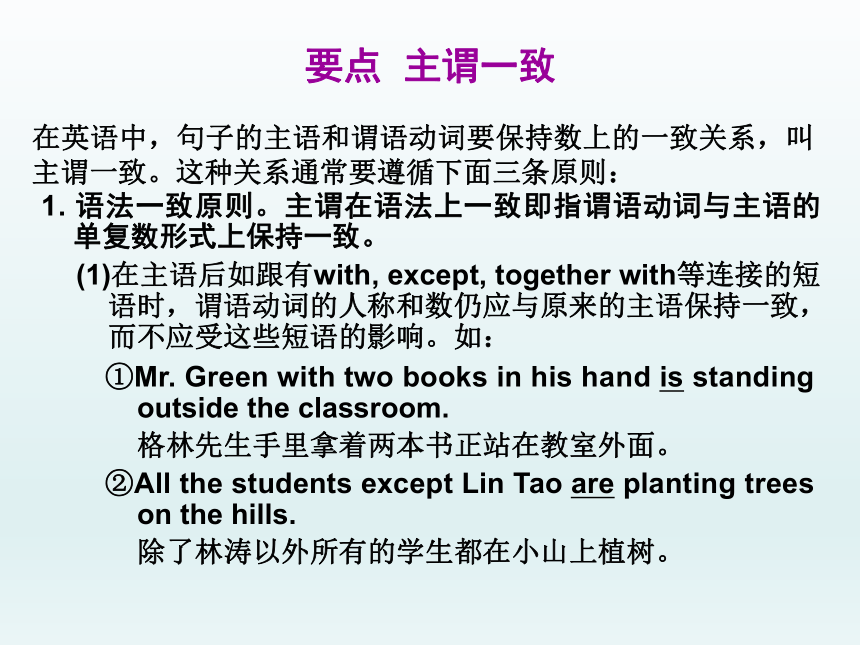
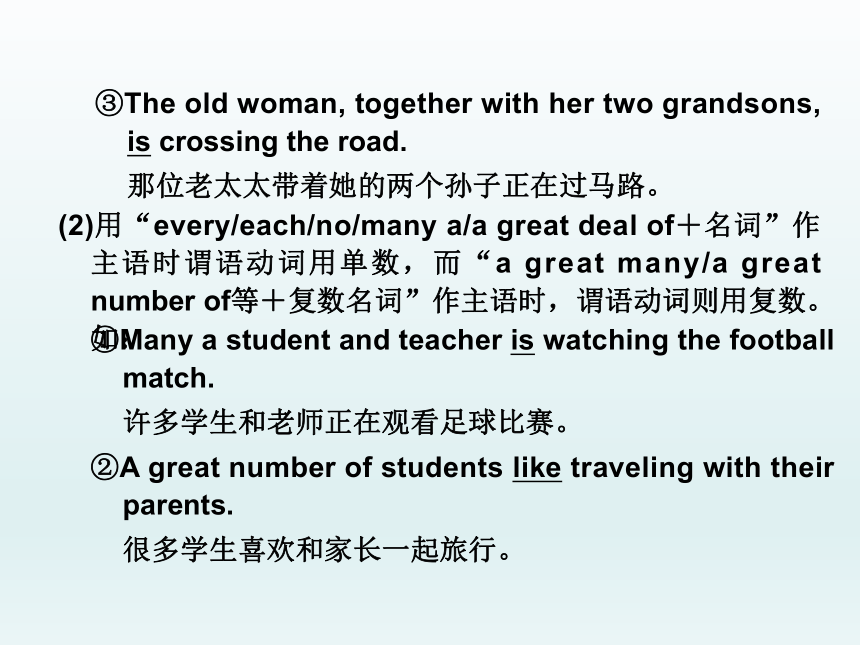
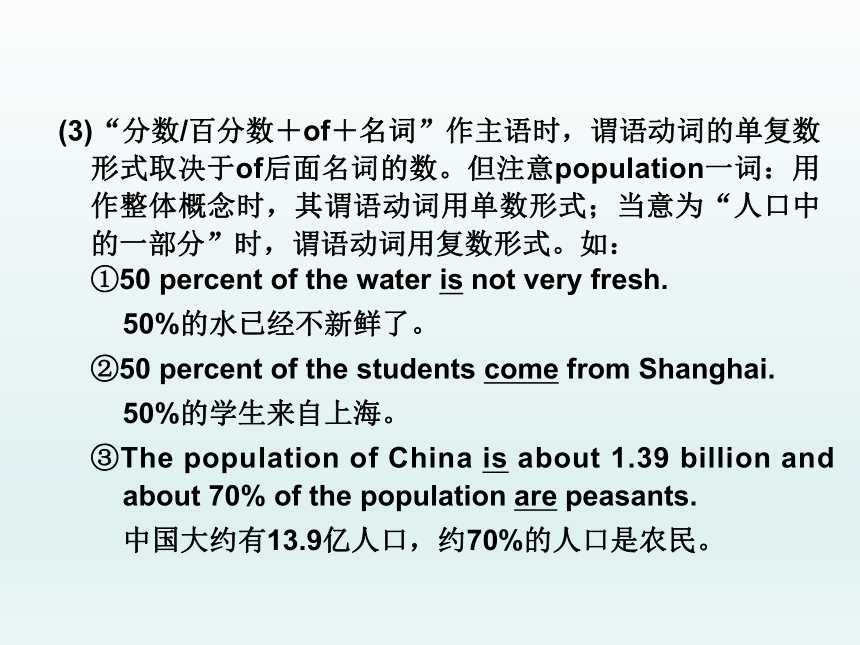
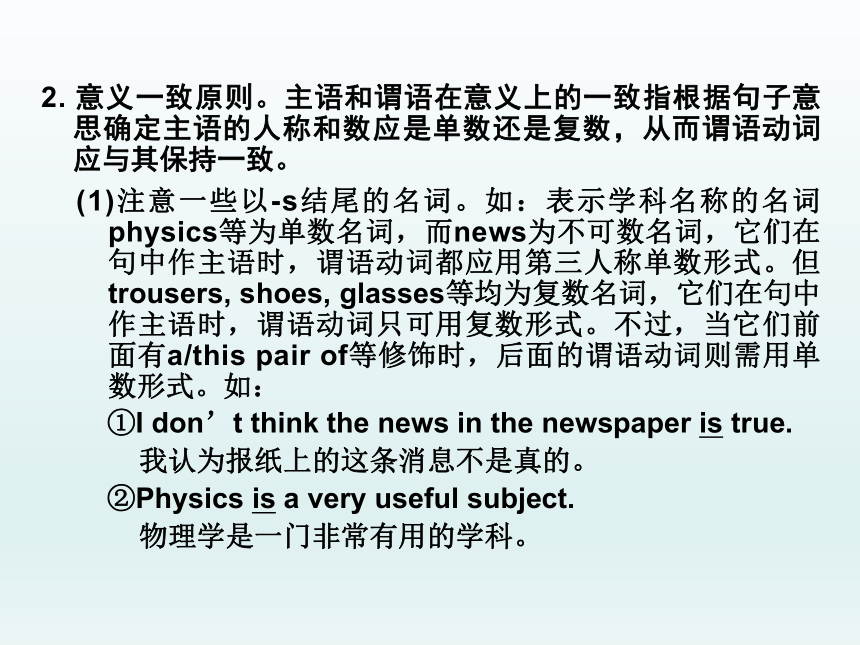
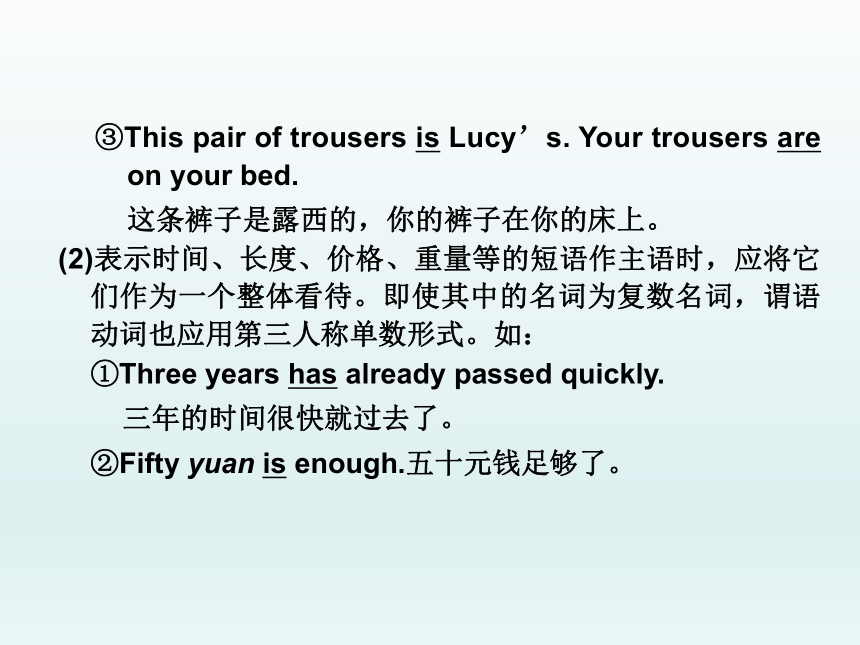
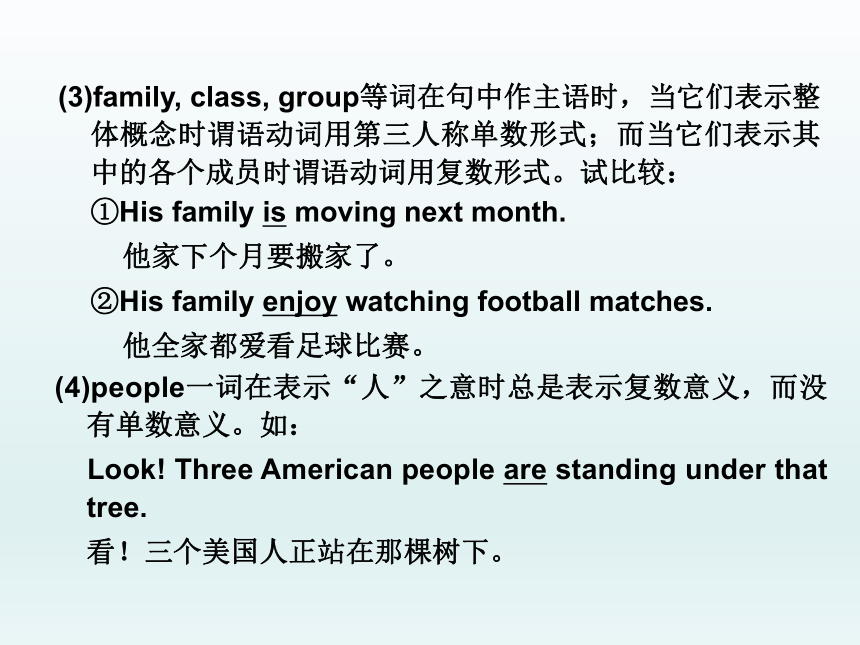
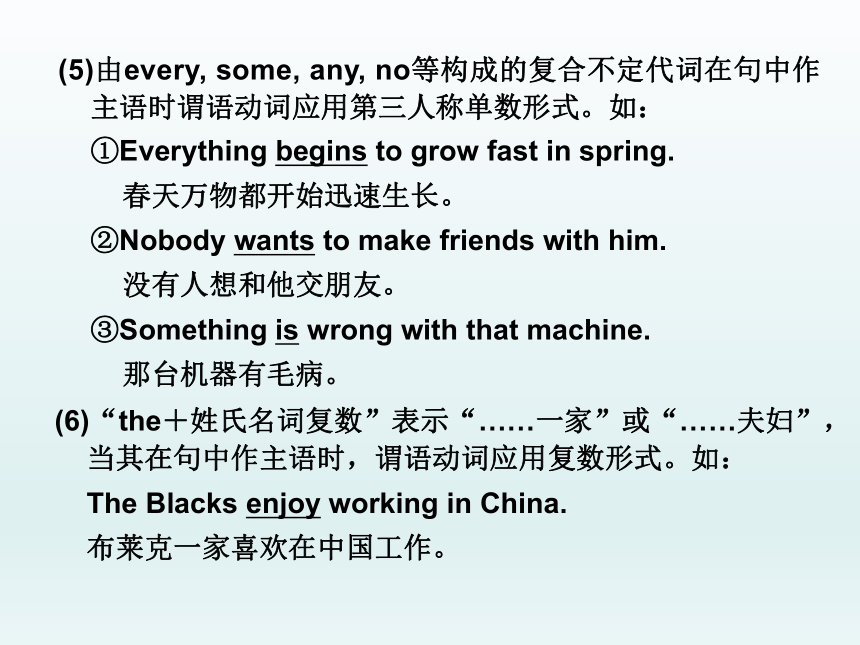
文档简介
主谓一致
在英语中,句子的主语和谓语动词要保持数上的一致关系,叫主谓一致。这种关系通常要遵循下面三条原则:
要点 主谓一致
1. 语法一致原则。主谓在语法上一致即指谓语动词与主语的单复数形式上保持一致。
(1)在主语后如跟有with, except, together with等连接的短语时,谓语动词的人称和数仍应与原来的主语保持一致,而不应受这些短语的影响。如:
①Mr. Green with two books in his hand is standing outside the classroom.
格林先生手里拿着两本书正站在教室外面。
②All the students except Lin Tao are planting trees on the hills.
除了林涛以外所有的学生都在小山上植树。
(2)用“every/each/no/many a/a great deal of+名词”作主语时谓语动词用单数,而“a great many/a great number of等+复数名词”作主语时,谓语动词则用复数。如:
③The old woman, together with her two grandsons, is crossing the road.
那位老太太带着她的两个孙子正在过马路。
①Many a student and teacher is watching the football match.
许多学生和老师正在观看足球比赛。
②A great number of students like traveling with their parents.
很多学生喜欢和家长一起旅行。
(3)“分数/百分数+of+名词”作主语时,谓语动词的单复数形式取决于of后面名词的数。但注意population一词:用作整体概念时,其谓语动词用单数形式;当意为“人口中的一部分”时,谓语动词用复数形式。如:
①50 percent of the water is not very fresh.
50%的水已经不新鲜了。
②50 percent of the students come from Shanghai.
50%的学生来自上海。
③The population of China is about 1.39 billion and about 70% of the population are peasants.
中国大约有13.9亿人口,约70%的人口是农民。
2. 意义一致原则。主语和谓语在意义上的一致指根据句子意思确定主语的人称和数应是单数还是复数,从而谓语动词应与其保持一致。
(1)注意一些以-s结尾的名词。如:表示学科名称的名词physics等为单数名词,而news为不可数名词,它们在句中作主语时,谓语动词都应用第三人称单数形式。但trousers, shoes, glasses等均为复数名词,它们在句中作主语时,谓语动词只可用复数形式。不过,当它们前面有a/this pair of等修饰时,后面的谓语动词则需用单数形式。如:
①I don’t think the news in the newspaper is true.
我认为报纸上的这条消息不是真的。
②Physics is a very useful subject.
物理学是一门非常有用的学科。
(2)表示时间、长度、价格、重量等的短语作主语时,应将它们作为一个整体看待。即使其中的名词为复数名词,谓语动词也应用第三人称单数形式。如:
③This pair of trousers is Lucy’s. Your trousers are on your bed.
这条裤子是露西的,你的裤子在你的床上。
①Three years has already passed quickly.
三年的时间很快就过去了。
②Fifty yuan is enough.五十元钱足够了。
(3)family, class, group等词在句中作主语时,当它们表示整体概念时谓语动词用第三人称单数形式;而当它们表示其中的各个成员时谓语动词用复数形式。试比较:
(4)people一词在表示“人”之意时总是表示复数意义,而没有单数意义。如:
Look! Three American people are standing under that tree.
看!三个美国人正站在那棵树下。
①His family is moving next month.
他家下个月要搬家了。
②His family enjoy watching football matches.
他全家都爱看足球比赛。
(5)由every, some, any, no等构成的复合不定代词在句中作主语时谓语动词应用第三人称单数形式。如:
(6)“the+姓氏名词复数”表示“……一家”或“……夫妇”,当其在句中作主语时,谓语动词应用复数形式。如:
The Blacks enjoy working in China.
布莱克一家喜欢在中国工作。
①Everything begins to grow fast in spring.
春天万物都开始迅速生长。
②Nobody wants to make friends with him.
没有人想和他交朋友。
③Something is wrong with that machine.
那台机器有毛病。
(7)“neither+单数名词”或“neither of+复数名词”在句中作主语时,谓语动词用第三人称单数形式。如:
(8)动名词、动词不定式或从句在句子中作主语时,谓语动词应用单数形式。如:
①Climbing hills is better than having classes.
爬山比上课要好些。
②To do is much more difficult than to say.
做比说要难得多。
①Neither answer is right.
两个答案都不对。
②Neither of the twins likes bread.
那对双胞胎都不喜欢吃面包。
(9)none作主语时,谓语动词可用单数或复数。如:
(10)“the+形容词/-ed分词”这一表示一类人的结构作主语时,谓语动词用复数。如:
①The young are looking forward to the future while
the old are recalling the past.
年轻人展望未来,而老年人回顾过去。
②The injured have been taken to hospital.
伤员已被送往医院。
①None knows/know a great deal about this experiment.
没有一个人对这项实验知道得很多。
②None has/have been found.
一个也没找到。
3. 就近原则。就近原则即指谓语的人称和数与靠近它的那个主语保持一致。有下面几种情况:
(1)在there be句型中或以here开头的句子中,谓语动词be应与后面的名词保持一致,当后面的名词不止一个时,be的人称和数应与和其最靠近的那个名词的人称和数保持一致。如:
①There are twenty-two boys and twenty girls in our class.
我们班有22名男生和20名女生。
②There is a car and two jeeps behind the house.
房子后有一辆小汽车和两辆吉普车。
③Here are two oranges and some milk.
这里有两个橘子和一些牛奶。
(2)either...or...(或者……或者……),neither...nor...(……和……都不……),...or...(……或者……),not only...but also...(不但……而且……)等平行结构,连接并列主语时谓语动词的数应和与之靠近的一个主语保持一致。如:
①Either you or he has to stay at home this afternoon.
今天下午你或他有一个必须待在家。
②Neither he nor I am a student now.
他和我现在都不是学生了。
巩固训练
用括号中所给词的适当形式填空
1.The best things in life ________(be) free, like smiles, love and good memories.
【解析】are 主语为可数名词复数,be动词用are。
2.About 300 to 1,300 red-crowned cranes ________(fly) to Yancheng Nature Reserve every year to spend the winter.
【解析】fly 主语为可数名词复数,动词用fly。
3.The silk scarf is pretty and ________(match) her blue coat very well.
【解析】matches 主语为单数形式,且为一般现在时,动词用单数形式。
4.—What do you think of the environment here, Mr. Wang?
—Wonderful! Two fifths of the land ________(be) covered with trees and grass.
【解析】is “分数+of+名词”作主语时,谓语动词遵循主谓一致原则,主语the land为不可数名词,故填is。
5.Not only children but also my husband ________(be) crazy about the movie Operation Red Sea.
【解析】is/was not only...but also...连接并列主语时,谓语动词的数应和与之靠近的一个主语保持一致。
一、用括号中所给词的适当形式填空
当堂检测
1.Learning ________(be) a lifelong journey because every day ________(bring) something new.
2.Nowadays, plenty of people ________(like) this kind of food, and about three fifths ________(be) young people.
3.A number of visitors ________(be) visiting the West Lake and the number of the visitors ________(be) increasing.
4.There ________(be) a teacher and some students playing games on the playground now.
5.Many a boy and many a girl ________(have) seen the film.
【答案】1.is, brings 2.like, are 3.are, is 4.is 5.has
二、用方框中所给单词的适当形式填空。每词限用一次。
6.I think growing vegetables ________ a lot of hard work.
7.Neither of my parents ________ to work by car. They take the subway instead.
8.Not only my parents but also my little sister ________ watching football matches every week.
9.Neither Jim nor Tom ________ been to Australia before, but they know the country very well.
10.All students except Jim ________ sent to hospital just now.
【答案】6.needs 7.goes 8.likes 9.has 10.were
have, like, need, be, go
三、语法填空
阅读下面短文,在空白处填入一个适当的词,或填入括号中所给单词的正确形式。
Anna lost her arms in a car accident when she was a child. What was worse, she lost her parents 11.________ the age of twenty. Her elder sister, who was ten years 12.________(old) than her, wanted to take care of her. However, Anna refused 13.________(live) with her sister, saying that she would like to take care of herself. She managed to enter college and 14.________(study) very hard. Four years later, she graduated and found a job. Once she wrote in her diary, “I am quite lucky. I lost my arms, 15.________ I still have my legs.”
Anna chose to face her misfortune(不幸) in an active way. Instead of 16.________(feel) sad every day, she decided not to let it hold her back. She has taught us a good lesson. When something bad happens to us, we have two 17.________(choice). One is to complain(抱怨), and 18.________ other is to face it bravely. If we choose to run away, 19.________ will follow us wherever we go. If we decide to be strong, new hopes will come. So choose 20.________(wise).
【答案】11.at 12.older 13.to live 14.studied 15.but 16.feeling 17.choices 18.the 19.it 20.wisely
【解析】11.短语at the age of...意为“在……岁时”。
12.由空后的than可知,此处要用old的比较级older。
13.refuse to do sth.意为“拒绝做某事”。
14.and在句中连接两个并列的谓语,由前面managed可知,此处也要用一般过去时,故填studied。
15.结合语境可推知,空格前后内容之间是转折关系,故填but。
16.instead of后跟名词、代词或动名词,故此处填feeling。
17.由空前的two可知,此处要用choice的复数形式。
18.one...the other...意为“一个……另一个……”,用于两者之间。
19.根据上文可推知,此处需用it来指代上文提到的misfortune。
20.修饰动词choose用副词wisely。
在英语中,句子的主语和谓语动词要保持数上的一致关系,叫主谓一致。这种关系通常要遵循下面三条原则:
要点 主谓一致
1. 语法一致原则。主谓在语法上一致即指谓语动词与主语的单复数形式上保持一致。
(1)在主语后如跟有with, except, together with等连接的短语时,谓语动词的人称和数仍应与原来的主语保持一致,而不应受这些短语的影响。如:
①Mr. Green with two books in his hand is standing outside the classroom.
格林先生手里拿着两本书正站在教室外面。
②All the students except Lin Tao are planting trees on the hills.
除了林涛以外所有的学生都在小山上植树。
(2)用“every/each/no/many a/a great deal of+名词”作主语时谓语动词用单数,而“a great many/a great number of等+复数名词”作主语时,谓语动词则用复数。如:
③The old woman, together with her two grandsons, is crossing the road.
那位老太太带着她的两个孙子正在过马路。
①Many a student and teacher is watching the football match.
许多学生和老师正在观看足球比赛。
②A great number of students like traveling with their parents.
很多学生喜欢和家长一起旅行。
(3)“分数/百分数+of+名词”作主语时,谓语动词的单复数形式取决于of后面名词的数。但注意population一词:用作整体概念时,其谓语动词用单数形式;当意为“人口中的一部分”时,谓语动词用复数形式。如:
①50 percent of the water is not very fresh.
50%的水已经不新鲜了。
②50 percent of the students come from Shanghai.
50%的学生来自上海。
③The population of China is about 1.39 billion and about 70% of the population are peasants.
中国大约有13.9亿人口,约70%的人口是农民。
2. 意义一致原则。主语和谓语在意义上的一致指根据句子意思确定主语的人称和数应是单数还是复数,从而谓语动词应与其保持一致。
(1)注意一些以-s结尾的名词。如:表示学科名称的名词physics等为单数名词,而news为不可数名词,它们在句中作主语时,谓语动词都应用第三人称单数形式。但trousers, shoes, glasses等均为复数名词,它们在句中作主语时,谓语动词只可用复数形式。不过,当它们前面有a/this pair of等修饰时,后面的谓语动词则需用单数形式。如:
①I don’t think the news in the newspaper is true.
我认为报纸上的这条消息不是真的。
②Physics is a very useful subject.
物理学是一门非常有用的学科。
(2)表示时间、长度、价格、重量等的短语作主语时,应将它们作为一个整体看待。即使其中的名词为复数名词,谓语动词也应用第三人称单数形式。如:
③This pair of trousers is Lucy’s. Your trousers are on your bed.
这条裤子是露西的,你的裤子在你的床上。
①Three years has already passed quickly.
三年的时间很快就过去了。
②Fifty yuan is enough.五十元钱足够了。
(3)family, class, group等词在句中作主语时,当它们表示整体概念时谓语动词用第三人称单数形式;而当它们表示其中的各个成员时谓语动词用复数形式。试比较:
(4)people一词在表示“人”之意时总是表示复数意义,而没有单数意义。如:
Look! Three American people are standing under that tree.
看!三个美国人正站在那棵树下。
①His family is moving next month.
他家下个月要搬家了。
②His family enjoy watching football matches.
他全家都爱看足球比赛。
(5)由every, some, any, no等构成的复合不定代词在句中作主语时谓语动词应用第三人称单数形式。如:
(6)“the+姓氏名词复数”表示“……一家”或“……夫妇”,当其在句中作主语时,谓语动词应用复数形式。如:
The Blacks enjoy working in China.
布莱克一家喜欢在中国工作。
①Everything begins to grow fast in spring.
春天万物都开始迅速生长。
②Nobody wants to make friends with him.
没有人想和他交朋友。
③Something is wrong with that machine.
那台机器有毛病。
(7)“neither+单数名词”或“neither of+复数名词”在句中作主语时,谓语动词用第三人称单数形式。如:
(8)动名词、动词不定式或从句在句子中作主语时,谓语动词应用单数形式。如:
①Climbing hills is better than having classes.
爬山比上课要好些。
②To do is much more difficult than to say.
做比说要难得多。
①Neither answer is right.
两个答案都不对。
②Neither of the twins likes bread.
那对双胞胎都不喜欢吃面包。
(9)none作主语时,谓语动词可用单数或复数。如:
(10)“the+形容词/-ed分词”这一表示一类人的结构作主语时,谓语动词用复数。如:
①The young are looking forward to the future while
the old are recalling the past.
年轻人展望未来,而老年人回顾过去。
②The injured have been taken to hospital.
伤员已被送往医院。
①None knows/know a great deal about this experiment.
没有一个人对这项实验知道得很多。
②None has/have been found.
一个也没找到。
3. 就近原则。就近原则即指谓语的人称和数与靠近它的那个主语保持一致。有下面几种情况:
(1)在there be句型中或以here开头的句子中,谓语动词be应与后面的名词保持一致,当后面的名词不止一个时,be的人称和数应与和其最靠近的那个名词的人称和数保持一致。如:
①There are twenty-two boys and twenty girls in our class.
我们班有22名男生和20名女生。
②There is a car and two jeeps behind the house.
房子后有一辆小汽车和两辆吉普车。
③Here are two oranges and some milk.
这里有两个橘子和一些牛奶。
(2)either...or...(或者……或者……),neither...nor...(……和……都不……),...or...(……或者……),not only...but also...(不但……而且……)等平行结构,连接并列主语时谓语动词的数应和与之靠近的一个主语保持一致。如:
①Either you or he has to stay at home this afternoon.
今天下午你或他有一个必须待在家。
②Neither he nor I am a student now.
他和我现在都不是学生了。
巩固训练
用括号中所给词的适当形式填空
1.The best things in life ________(be) free, like smiles, love and good memories.
【解析】are 主语为可数名词复数,be动词用are。
2.About 300 to 1,300 red-crowned cranes ________(fly) to Yancheng Nature Reserve every year to spend the winter.
【解析】fly 主语为可数名词复数,动词用fly。
3.The silk scarf is pretty and ________(match) her blue coat very well.
【解析】matches 主语为单数形式,且为一般现在时,动词用单数形式。
4.—What do you think of the environment here, Mr. Wang?
—Wonderful! Two fifths of the land ________(be) covered with trees and grass.
【解析】is “分数+of+名词”作主语时,谓语动词遵循主谓一致原则,主语the land为不可数名词,故填is。
5.Not only children but also my husband ________(be) crazy about the movie Operation Red Sea.
【解析】is/was not only...but also...连接并列主语时,谓语动词的数应和与之靠近的一个主语保持一致。
一、用括号中所给词的适当形式填空
当堂检测
1.Learning ________(be) a lifelong journey because every day ________(bring) something new.
2.Nowadays, plenty of people ________(like) this kind of food, and about three fifths ________(be) young people.
3.A number of visitors ________(be) visiting the West Lake and the number of the visitors ________(be) increasing.
4.There ________(be) a teacher and some students playing games on the playground now.
5.Many a boy and many a girl ________(have) seen the film.
【答案】1.is, brings 2.like, are 3.are, is 4.is 5.has
二、用方框中所给单词的适当形式填空。每词限用一次。
6.I think growing vegetables ________ a lot of hard work.
7.Neither of my parents ________ to work by car. They take the subway instead.
8.Not only my parents but also my little sister ________ watching football matches every week.
9.Neither Jim nor Tom ________ been to Australia before, but they know the country very well.
10.All students except Jim ________ sent to hospital just now.
【答案】6.needs 7.goes 8.likes 9.has 10.were
have, like, need, be, go
三、语法填空
阅读下面短文,在空白处填入一个适当的词,或填入括号中所给单词的正确形式。
Anna lost her arms in a car accident when she was a child. What was worse, she lost her parents 11.________ the age of twenty. Her elder sister, who was ten years 12.________(old) than her, wanted to take care of her. However, Anna refused 13.________(live) with her sister, saying that she would like to take care of herself. She managed to enter college and 14.________(study) very hard. Four years later, she graduated and found a job. Once she wrote in her diary, “I am quite lucky. I lost my arms, 15.________ I still have my legs.”
Anna chose to face her misfortune(不幸) in an active way. Instead of 16.________(feel) sad every day, she decided not to let it hold her back. She has taught us a good lesson. When something bad happens to us, we have two 17.________(choice). One is to complain(抱怨), and 18.________ other is to face it bravely. If we choose to run away, 19.________ will follow us wherever we go. If we decide to be strong, new hopes will come. So choose 20.________(wise).
【答案】11.at 12.older 13.to live 14.studied 15.but 16.feeling 17.choices 18.the 19.it 20.wisely
【解析】11.短语at the age of...意为“在……岁时”。
12.由空后的than可知,此处要用old的比较级older。
13.refuse to do sth.意为“拒绝做某事”。
14.and在句中连接两个并列的谓语,由前面managed可知,此处也要用一般过去时,故填studied。
15.结合语境可推知,空格前后内容之间是转折关系,故填but。
16.instead of后跟名词、代词或动名词,故此处填feeling。
17.由空前的two可知,此处要用choice的复数形式。
18.one...the other...意为“一个……另一个……”,用于两者之间。
19.根据上文可推知,此处需用it来指代上文提到的misfortune。
20.修饰动词choose用副词wisely。
同课章节目录
- 词法
- 名词
- 动词和动词短语
- 动词语态
- 动词时态
- 助动词和情态动词
- 非谓语动词
- 冠词
- 代词
- 数词和量词
- 形容词副词及其比较等级
- 介词和介词短语
- 连词和感叹词
- 构词法
- 相似、相近词比较
- 句法
- 陈述句
- 一般疑问句和否定疑问句
- 特殊疑问句及选择疑问句
- 反意疑问句
- 存在句(There be句型)
- 宾语从句
- 定语从句
- 状语从句
- 主谓一致问题
- 简单句
- 并列句
- 复合句
- 主谓一致
- 主、表语从句
- 名词性从句
- 直接引语和间接引语
- 虚拟语气
- 感叹句
- 强调句
- 倒装句
- 祈使句
- 句子的成分
- 句子的分类
- 题型专区
- 单项选择部分
- 易错题
- 完形填空
- 阅读理解
- 词汇练习
- 听说训练
- 句型转换
- 补全对话
- 短文改错
- 翻译
- 书面表达
- 任务型阅读
- 语法填空
- 其他资料
